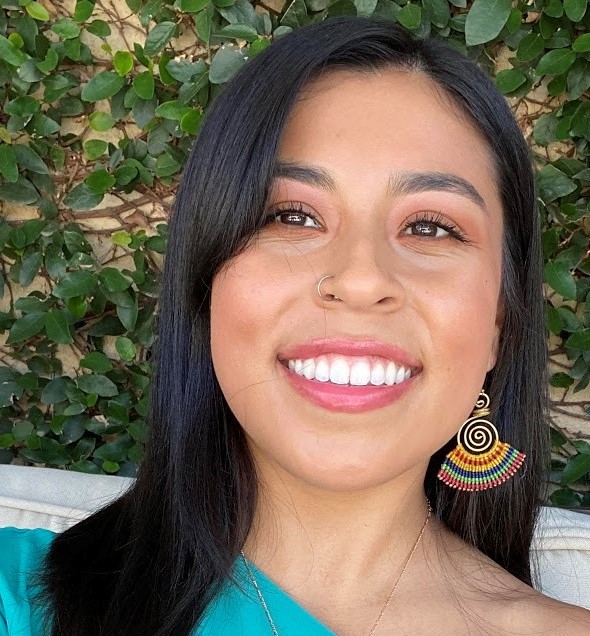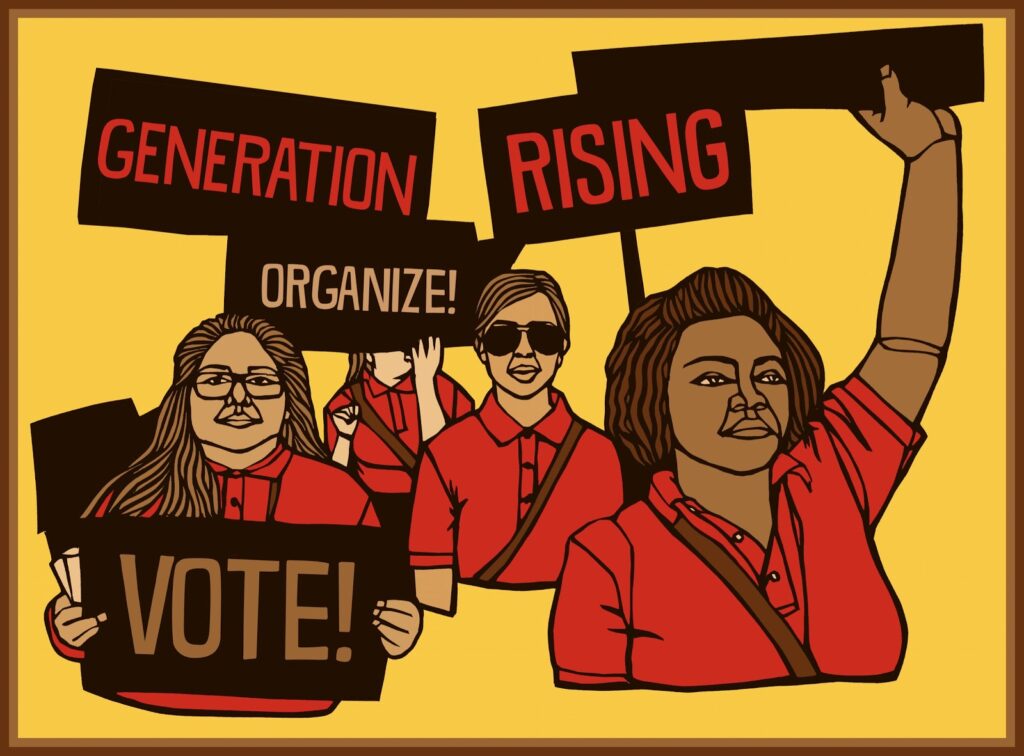“We need a multiracial movement where everyone should be included!”
That’s how Aaron Davis began to describe what he was envisioning for the movement. A movement that he is hopeful will be multiracial and multigenerational for universal liberation. Aaron is a 22-year-old, living in Philadelphia, Pennsylvania. He and I were among the thirty young Black, Indigenous, People of Color (BIPOC) who participated in Generation Rising this past Summer. Not only did we have thirty Fellows, but we were able to gain twenty new interns for Generation Rising to mobilize communities who are often left out or have opted out of the electoral process.
Generation Rising is a national program working with social justice movements in swing states to defeat Trump and build the power of young people of color for the long-haul. It is a partner program of Seed the Vote, and together the groups will be engaging 5,000 volunteers to contact one million voters and prevail in November.
Over the summer, interns and fellows supported working class communities of color through phone-banking, texting, and relational organizing in Florida and Pennsylvania. Together we made 86,521 calls and had 4,045 conversations for Florida’s Dream Defenders! We completed 150 Pennsylvania voter registrations and moved 1,000 people to register for vote by mail. Now, Generation Rising is preparing to start a Fall Organizing Fellowship with 70 fellows who are recruiting 500 young volunteers to join pods committed to phone banking each week.
Building up new leadership
This election is different than anything we have ever seen before. We are learning as we go, canvassing in unprecedented times for what might be the most important election for this generation.
This electoral canvassing is not like past campaigns due to COVID-19. We can’t meet up every day to knock on your door. But the upside is that it allows us to welcome new young BIPOC activists from all over the country. Not limited to one city, Generation Rising has adapted to this election cycle without in person rallies or handing out flyers but trying new and unique ways of organizing.
By working with around 100 fellows throughout the summer and fall we built the leadership of young BIPOC and are supporting young organizers to recruit and engage 500 volunteers for field work. During these untraditional times, we have found that phone banking is the safest and most effective method for persuasion and connection.
Youth of s work as, “getting people of color to the table for electoral politics so we can fight for our own liberation. The reality is that electoral outcomes impact the material conditions of BIPOC communities, and we can’t ignore that.”
Aaron knows firsthand the urgency of fighting for change. His mother works for the hospital, uses the hospital’s insurance and unfortunately, is currently dealing with a crippling debt of medical bills. This is an issue millions of Americans are currently facing because of COVID-19, showcasing the health care systems failures, disproportionately affecting BIPOC communities across this country. It is evident that our healthcare system is more concerned about politicized profit than it is about healing communities and providing resources.
Aaron says he sees this moment as a product of the neo-liberal movement that came to power with Ronald Reagan. A recent graduate of University of Pennsylvania, Aaron has seen the way Reaganomics still affects his community. Aaron recognizes how Pennsylvania has been left behind, leaving thousands jobless, working with a statewide minimum wage of $7.25, and never allowing any progressive policies to pass through the State Senate or House, both dominated by Republicans.
Moving unlikely allies
“This election is a turning point,” Aaron told me. “It really is the most important election. Pennsylvania has the opportunity to flip the State Senate. Without winning this election, it will be much harder for the people of Pennsylvania to win anything.”
Aaron saw new possibilities for change when he made a call to a voter in Pennsylvania who firmly stated that he was a Republican. But they talked and came to agree that the way the healthcare system is organized right now isn’t working for anyone.
Aaron describes how that conversation convinced him that the left can and must work to move unlikely allies, “There is always commonality in our experiences, no matter how different we are, there are these things we share as people who live in this country, under this system. We can’t move people if we aren’t willing to do the work, and it’s hard, and it sucks, and it’s uncomfortable at times, but there is the possibility of moving people into our movement, to see where we are coming from… The work we do is for us but it’s for everyone, getting people to connect their own struggles to other struggles going on nationally and globally was revealed to me in that one conversation.”
Aaron stresses the need for collective, organized action. Generation Rising and its local partner, Pennsylvania Stands Up, provided the tools and training for deep canvassing, grassroots and relational organizing, and fundraising. “Only through solidarity will we win. We need to build these strong bonds to build power to win the things we need. There are more of us than there are of them,” he says, pointing to the lasting impact of the student-to-organizing pipeline that Generation Rising created.
“The good kind of uncomfortable”
Generation Rising also engaged BIPOC youth in Florida, another key swing state for this year’s presidential election. Linh Dan Do, an 18-year-old intern for Generation Rising volunteering from Miami, describes what this summer was like for her:
“Being a first-time voter and being in Generation Rising, [having political education workshops] every Tuesday, talking about these issues and topics around immigration or disability justice, was profound. I’ve never been in a space that’s been so open as Generation Rising, or so free to talk about things that are usually uncomfortable to talk about.”
Participating from one of the key states, Linh Dan, understands firsthand how this will affect so many people in her community, especially undocumented folks in Miami. Immigrants are relying on these votes, knowing that another four years of Trump would be “life or death.”
Linh Dan did phone banking and texting with Generation Rising and its partner, Florida Dream Defenders, for the first time. She describes the experience as the “good kind of uncomfortable” that pushed her outside of her comfort zone to make a difference in her community. Through this discomfort, she now has the tools to be a better student organizer on campus at Stanford. Linh Dan feels more politically aware, is able to educate others in her life, and is empowered to motivate other young voters like herself to vote in their first presidential election. Linh Dan says, “even though I am a first-time voter, I still have a lot of power, and it counts now more than ever!”
High stakes for the most marginalized
Generation Rising is empowering young BIPOC like Linh Dan to vote for the first time in Florida in November’s election, and moving Aaron to connect his community to electoral work in Pennsylvania. We understand that this political moment is bigger than any of us.
As for me, being from California, it is hard to realize that people in these swing states and other pro-Trump voters don’t see the fascism we are currently facing. How are people willing to vote for a man who has 25 misconduct and an assault allegation filed against him? A president whose qualifications extend to failed businesses and a reality TV show?
But this summer I was reminded of community. I was scared of logging onto zoom and not being able to make any connections, but the opposite happened. I created friendship, met comrades in the struggle and gained new skills that I will take forever with me. While many of us wish for a more progressive candidate, at Generation Rising I became convinced that this election is bigger than just voting for the lesser of two evils. It is a vote for my community. A vote for undocumented folks. A vote for those who are incarcerated. A vote for the youth who have a lot to say about this political system. This is a world we are building, for Black, Indigenous, Trans, Disabled, Houseless, Incarcerated, Undocumented, working class, people of color. For those too young to vote but know they will be faced with the most climate battles in the future.
Those of us from California shouldn’t count ourselves out of the vote because this state claims to be “progressive.” A lot is on the ballot here (Schools and Communities First, for example) and people in other states are asking for all hands in.
Generation Rising gave me the hope to believe in my community, the confidence to say that our vote does matter, our voices matter. I am grateful for those who guided us through every political education workshop, self-interest lesson, and healing space, reminding us that we are human in all of this. And we can’t win this election without each other.
As John Lewis once said, “The vote is the most powerful nonviolent change agent you have in a democratic society.”
Recruitment is continuing for BIPOC youth interested in working with Generation Rising. You can find information about joining a Generation Rising pod here.
Did you enjoy this article?
We're in the middle of our annual fund drive, and this year we're building our own internal infrastructure for subscriptions, meaning more of every dollar pledged goes to fulfilling our mission. Subscribe today to support our work and be a part of Convergence's next evolution.
Did you enjoy this article?
We're in the middle of our annual fund drive, and this year we're building our own internal infrastructure for subscriptions, meaning more of every dollar pledged goes to fulfilling our mission. Subscribe today to support our work and be a part of Convergence's next evolution.

